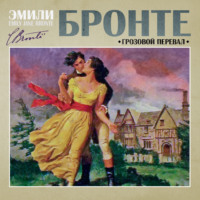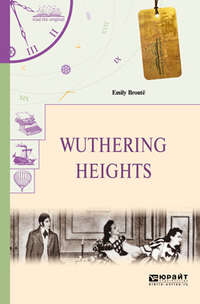 полная версия
полная версияWuthering Heights
Hareton, during the discussion, stood with his hands in his pockets, too awkward to speak; though he looked as if he did not relish my intrusion.
'How long am I to wait?' I continued, disregarding the woman's interference. 'It will be dark in ten minutes. Where is the pony, Miss Cathy? And where is Phoenix? I shall leave you, unless you be quick; so please yourself.'
'The pony is in the yard,' she replied, 'and Phoenix is shut in there. He's bitten – and so is Charlie. I was going to tell you all about it; but you are in a bad temper, and don't deserve to hear.'
I picked up her hat, and approached to reinstate it; but perceiving that the people of the house took her part, she commenced capering round the room; and on my giving chase, ran like a mouse over and under and behind the furniture, rendering it ridiculous for me to pursue. Hareton and the woman laughed, and she joined them, and waxed more impertinent still; till I cried, in great irritation, – 'Well, Miss Cathy, if you were aware whose house this is you'd be glad enough to get out.'
'It's YOUR father's, isn't it?' said she, turning to Hareton.
'Nay,' he replied, looking down, and blushing bashfully.
He could not stand a steady gaze from her eyes, though they were just his own.
'Whose then – your master's?' she asked.
He coloured deeper, with a different feeling, muttered an oath, and turned away.
'Who is his master?' continued the tiresome girl, appealing to me. 'He talked about "our house," and "our folk." I thought he had been the owner's son. And he never said Miss: he should have done, shouldn't he, if he's a servant?'
Hareton grew black as a thunder-cloud at this childish speech. I silently shook my questioner, and at last succeeded in equipping her for departure.
'Now, get my horse,' she said, addressing her unknown kinsman as she would one of the stable-boys at the Grange. 'And you may come with me. I want to see where the goblin-hunter rises in the marsh, and to hear about the FAIRISHES, as you call them: but make haste! What's the matter? Get my horse, I say.'
'I'll see thee damned before I be THY servant!' growled the lad.
"You'll see me WHAT!' asked Catherine in surprise.
'Damned – thou saucy witch!' he replied.
'There, Miss Cathy! you see you have got into pretty company,' I interposed. 'Nice words to be used to a young lady! Pray don't begin to dispute with him. Come, let us seek for Minny ourselves, and begone.'
'But, Ellen,' cried she, staring fixed in astonishment, 'how dare he speak so to me? Mustn't he be made to do as I ask him? You wicked creature, I shall tell papa what you said. – Now, then!'
Hareton did not appear to feel this threat; so the tears sprang into her eyes with indignation. 'You bring the pony,' she exclaimed, turning to the woman, 'and let my dog free this moment!'
'Softly, Miss,' answered she addressed: 'you'll lose nothing by being civil. Though Mr. Hareton, there, be not the master's son, he's your cousin: and I was never hired to serve you.'
'HE my cousin!' cried Cathy, with a scornful laugh.
'Yes, indeed,' responded her reprover.
'Oh, Ellen! don't let them say such things,' she pursued in great trouble. 'Papa is gone to fetch my cousin from London: my cousin is a gentleman's son. That my – ' she stopped, and wept outright; upset at the bare notion of relationship with such a clown.
'Hush, hush!' I whispered; 'people can have many cousins and of all sorts, Miss Cathy, without being any the worse for it; only they needn't keep their company, if they be disagreeable and bad.'
'He's not – he's not my cousin, Ellen!' she went on, gathering fresh grief from reflection, and flinging herself into my arms for refuge from the idea.
I was much vexed at her and the servant for their mutual revelations; having no doubt of Linton's approaching arrival, communicated by the former, being reported to Mr. Heathcliff; and feeling as confident that Catherine's first thought on her father's return would be to seek an explanation of the latter's assertion concerning her rude-bred kindred. Hareton, recovering from his disgust at being taken for a servant, seemed moved by her distress; and, having fetched the pony round to the door, he took, to propitiate her, a fine crooked-legged terrier whelp from the kennel, and putting it into her hand, bid her whist! for he meant nought. Pausing in her lamentations, she surveyed him with a glance of awe and horror, then burst forth anew.
I could scarcely refrain from smiling at this antipathy to the poor fellow; who was a well-made, athletic youth, good-looking in features, and stout and healthy, but attired in garments befitting his daily occupations of working on the farm and lounging among the moors after rabbits and game. Still, I thought I could detect in his physiognomy a mind owning better qualities than his father ever possessed. Good things lost amid a wilderness of weeds, to be sure, whose rankness far over-topped their neglected growth; yet, notwithstanding, evidence of a wealthy soil, that might yield luxuriant crops under other and favourable circumstances. Mr. Heathcliff, I believe, had not treated him physically ill; thanks to his fearless nature, which offered no temptation to that course of oppression: he had none of the timid susceptibility that would have given zest to ill-treatment, in Heathcliff s judgment. He appeared to have bent his malevolence on making him a brute: he was never taught to read or write; never rebuked for any bad habit which did not annoy his keeper; never led a single step towards virtue, or guarded by a single precept against vice. And from what I heard, Joseph contributed much to his deterioration, by a narrow– minded partiality which prompted him to flatter and pet him, as a boy, because he was the head of the old family. And as he had been in the habit of accusing Catherine Earnshaw and Heathcliff, when children, of putting the master past his patience, and compelling him to seek solace in drink by what he termed their 'offald ways,' so at present he laid the whole burden of Hareton's faults on the shoulders of the usurper of his property. If the lad swore, he wouldn't correct him: nor however culpably he behaved. It gave Joseph satisfaction, apparently, to watch him go the worst lengths: he allowed that the lad was ruined: that his soul was abandoned to perdition; but then he reflected that Heathcliff must answer for it. Hareton's blood would be required at his hands; and there lay immense consolation in that thought. Joseph had instilled into him a pride of name, and of his lineage; he would, had he dared, have fostered hate between him and the present owner of the Heights: but his dread of that owner amounted to superstition; and he confined his feelings regarding him to muttered innuendoes and private comminations. I don't pretend to be intimately acquainted with the mode of living customary in those days at Wuthering Heights: I only speak from hearsay; for I saw little. The villagers affirmed Mr. Heathcliff was NEAR, and a cruel hard landlord to his tenants; but the house, inside, had regained its ancient aspect of comfort under female management, and the scenes of riot common in Hindley's time were not now enacted within its walls. The master was too gloomy to seek companionship with any people, good or bad; and he is yet.
This, however, is not making progress with my story. Miss Cathy rejected the peace-offering of the terrier, and demanded her own dogs, Charlie and Phoenix. They came limping and hanging their heads; and we set out for home, sadly out of sorts, every one of us. I could not wring from my little lady how she had spent the day; except that, as I supposed, the goal of her pilgrimage was Penistone Crags; and she arrived without adventure to the gate of the farm-house, when Hareton happened to issue forth, attended by some canine followers, who attacked her train. They had a smart battle, before their owners could separate them: that formed an introduction. Catherine told Hareton who she was, and where she was going; and asked him to show her the way: finally, beguiling him to accompany her. He opened the mysteries of the Fairy Cave, and twenty other queer places. But, being in disgrace, I was not favoured with a description of the interesting objects she saw. I could gather, however, that her guide had been a favourite till she hurt his feelings by addressing him as a servant; and Heathcliff's housekeeper hurt hers by calling him her cousin. Then the language he had held to her rankled in her heart; she who was always 'love,' and 'darling,' and 'queen,' and 'angel,' with everybody at the Grange, to be insulted so shockingly by a stranger! She did not comprehend it; and hard work I had to obtain a promise that she would not lay the grievance before her father. I explained how he objected to the whole household at the Heights, and how sorry he would be to find she had been there; but I insisted most on the fact, that if she revealed my negligence of his orders, he would perhaps be so angry that I should have to leave; and Cathy couldn't bear that prospect: she pledged her word, and kept it for my sake. After all, she was a sweet little girl.
Chapter XIX
A LETTER, edged with black, announced the day of my master's return, Isabella was dead; and he wrote to bid me get mourning for his daughter, and arrange a room, and other accommodations, for his youthful nephew. Catherine ran wild with joy at the idea of welcoming her father back; and indulged most sanguine anticipations of the innumerable excellencies of her 'real' cousin. The evening of their expected arrival came. Since early morning she had been busy ordering her own small affairs; and now attired in her new black frock – poor thing! her aunt's death impressed her with no definite sorrow – she obliged me, by constant worrying, to walk with her down through the grounds to meet them.
'Linton is just six months younger than I am,' she chattered, as we strolled leisurely over the swells and hollows of mossy turf, under shadow of the trees. 'How delightful it will be to have him for a playfellow! Aunt Isabella sent papa a beautiful lock of his hair; it was lighter than mine – more flaxen, and quite as fine. I have it carefully preserved in a little glass box; and I've often thought what a pleasure it would be to see its owner. Oh! I am happy – and papa, dear, dear papa! Come, Ellen, let us run! come, run.'
She ran, and returned and ran again, many times before my sober footsteps reached the gate, and then she seated herself on the grassy bank beside the path, and tried to wait patiently; but that was impossible: she couldn't be still a minute.
'How long they are!' she exclaimed. 'Ah, I see, some dust on the road – they are coming! No! When will they be here? May we not go a little way – half a mile, Ellen, only just half a mile? Do say Yes: to that clump of birches at the turn!'
I refused staunchly. At length her suspense was ended: the travelling carriage rolled in sight. Miss Cathy shrieked and stretched out her arms as soon as she caught her father's face looking from the window. He descended, nearly as eager as herself; and a considerable interval elapsed ere they had a thought to spare for any but themselves. While they exchanged caresses I took a peep in to see after Linton. He was asleep in a corner, wrapped in a warm, fur-lined cloak, as if it had been winter. A pale, delicate, effeminate boy, who might have been taken for my master's younger brother, so strong was the resemblance: but there was a sickly peevishness in his aspect that Edgar Linton never had. The latter saw me looking; and having shaken hands, advised me to close the door, and leave him undisturbed; for the journey had fatigued him. Cathy would fain have taken one glance, but her father told her to come, and they walked together up the park, while I hastened before to prepare the servants.
'Now, darling,' said Mr. Linton, addressing his daughter, as they halted at the bottom of the front steps: 'your cousin is not so strong or so merry as you are, and he has lost his mother, remember, a very short time since; therefore, don't expect him to play and run about with you directly. And don't harass him much by talking: let him be quiet this evening, at least, will you?'
'Yes, yes, papa,' answered Catherine: 'but I do want to see him; and he hasn't once looked out.'
The carriage stopped; and the sleeper being roused, was lifted to the ground by his uncle.
'This is your cousin Cathy, Linton,' he said, putting their little hands together. 'She's fond of you already; and mind you don't grieve her by crying to-night. Try to be cheerful now; the travelling is at an end, and you have nothing to do but rest and amuse yourself as you please.'
'Let me go to bed, then,' answered the boy, shrinking from Catherine's salute; and he put his fingers to remove incipient tears.
'Come, come, there's a good child,' I whispered, leading him in. 'You'll make her weep too – see how sorry she is for you!'
I do not know whether it was sorrow for him, but his cousin put on as sad a countenance as himself, and returned to her father. All three entered, and mounted to the library, where tea was laid ready. I proceeded to remove Linton's cap and mantle, and placed him on a chair by the table; but he was no sooner seated than he began to cry afresh. My master inquired what was the matter.
'I can't sit on a chair,' sobbed the boy.
'Go to the sofa, then, and Ellen shall bring you some tea,' answered his uncle patiently.
He had been greatly tried, during the journey, I felt convinced, by his fretful ailing charge. Linton slowly trailed himself off, and lay down. Cathy carried a footstool and her cup to his side. At first she sat silent; but that could not last: she had resolved to make a pet of her little cousin, as she would have him to be; and she commenced stroking his curls, and kissing his cheek, and offering him tea in her saucer, like a baby. This pleased him, for he was not much better: he dried his eyes, and lightened into a faint smile.
'Oh, he'll do very well,' said the master to me, after watching them a minute. 'Very well, if we can keep him, Ellen. The company of a child of his own age will instil new spirit into him soon, and by wishing for strength he'll gain it.'
'Ay, if we can keep him!' I mused to myself; and sore misgivings came over me that there was slight hope of that. And then, I thought, how ever will that weakling live at Wuthering Heights? Between his father and Hareton, what playmates and instructors they'll be. Our doubts were presently decided – even earlier than I expected. I had just taken the children up-stairs, after tea was finished, and seen Linton asleep – he would not suffer me to leave him till that was the case – I had come down, and was standing by the table in the hall, lighting a bedroom candle for Mr. Edgar, when a maid stepped out of the kitchen and informed me that Mr. Heathcliff's servant Joseph was at the door, and wished to speak with the master.
'I shall ask him what he wants first,' I said, in considerable trepidation. 'A very unlikely hour to be troubling people, and the instant they have returned from a long journey. I don't think the master can see him.'
Joseph had advanced through the kitchen as I uttered these words, and now presented himself in the hall. He was donned in his Sunday garments, with his most sanctimonious and sourest face, and, holding his hat in one hand, and his stick in the other, he proceeded to clean his shoes on the mat.
'Good-evening, Joseph,' I said, coldly. 'What business brings you here to-night?'
'It's Maister Linton I mun spake to,' he answered, waving me disdainfully aside.
'Mr. Linton is going to bed; unless you have something particular to say, I'm sure he won't hear it now,' I continued. 'You had better sit down in there, and entrust your message to me.'
'Which is his rahm?' pursued the fellow, surveying the range of closed doors.
I perceived he was bent on refusing my mediation, so very reluctantly I went up to the library, and announced the unseasonable visitor, advising that he should be dismissed till next day. Mr. Linton had no time to empower me to do so, for Joseph mounted close at my heels, and, pushing into the apartment, planted himself at the far side of the table, with his two fists clapped on the head of his stick, and began in an elevated tone, as if anticipating opposition -
'Hathecliff has sent me for his lad, and I munn't goa back 'bout him.'
Edgar Linton was silent a minute; an expression of exceeding sorrow overcast his features: he would have pitied the child on his own account; but, recalling Isabella's hopes and fears, and anxious wishes for her son, and her commendations of him to his care, he grieved bitterly at the prospect of yielding him up, and searched in his heart how it might be avoided. No plan offered itself: the very exhibition of any desire to keep him would have rendered the claimant more peremptory: there was nothing left but to resign him. However, he was not going to rouse him from his sleep.
'Tell Mr. Heathcliff,' he answered calmly, 'that his son shall come to Wuthering Heights to-morrow. He is in bed, and too tired to go the distance now. You may also tell him that the mother of Linton desired him to remain under my guardianship; and, at present, his health is very precarious.'
'Noa!' said Joseph, giving a thud with his prop on the floor, and assuming an authoritative air. 'Noa! that means naught. Hathecliff maks noa 'count o' t' mother, nor ye norther; but he'll heu' his lad; und I mun tak' him – soa now ye knaw!'
'You shall not to-night!' answered Linton decisively. 'Walk down stairs at once, and repeat to your master what I have said. Ellen, show him down. Go – '
And, aiding the indignant elder with a lift by the arm, he rid the room of him and closed the door.
'Varrah weell!' shouted Joseph, as he slowly drew off. 'To-morn, he's come hisseln, and thrust HIM out, if ye darr!'
Chapter XX
TO obviate the danger of this threat being fulfilled, Mr. Linton commissioned me to take the boy home early, on Catherine's pony; and, said he – 'As we shall now have no influence over his destiny, good or bad, you must say nothing of where he is gone to my daughter: she cannot associate with him hereafter, and it is better for her to remain in ignorance of his proximity; lest she should be restless, and anxious to visit the Heights. Merely tell her his father sent for him suddenly, and he has been obliged to leave us.'
Linton was very reluctant to be roused from his bed at five o'clock, and astonished to be informed that he must prepare for further travelling; but I softened off the matter by stating that he was going to spend some time with his father, Mr. Heathcliff, who wished to see him so much, he did not like to defer the pleasure till he should recover from his late journey.
'My father!' he cried, in strange perplexity. 'Mamma never told me I had a father. Where does he live? I'd rather stay with uncle.'
'He lives a little distance from the Grange,' I replied; 'just beyond those hills: not so far, but you may walk over here when you get hearty. And you should be glad to go home, and to see him. You must try to love him, as you did your mother, and then he will love you.'
'But why have I not heard of him before?' asked Linton. 'Why didn't mamma and he live together, as other people do?'
'He had business to keep him in the north,' I answered, 'and your mother's health required her to reside in the south.'
'And why didn't mamma speak to me about him?' persevered the child. 'She often talked of uncle, and I learnt to love him long ago. How am I to love papa? I don't know him.'
'Oh, all children love their parents,' I said. 'Your mother, perhaps, thought you would want to be with him if she mentioned him often to you. Let us make haste. An early ride on such a beautiful morning is much preferable to an hour's more sleep.'
'Is SHE to go with us,' he demanded, 'the little girl I saw yesterday?'
'Not now,' replied I.
'Is uncle?' he continued.
'No, I shall be your companion there,' I said.
Linton sank back on his pillow and fell into a brown study.
'I won't go without uncle,' he cried at length: 'I can't tell where you mean to take me.'
I attempted to persuade him of the naughtiness of showing reluctance to meet his father; still he obstinately resisted any progress towards dressing, and I had to call for my master's assistance in coaxing him out of bed. The poor thing was finally got off, with several delusive assurances that his absence should be short: that Mr. Edgar and Cathy would visit him, and other promises, equally ill-founded, which I invented and reiterated at intervals throughout the way. The pure heather-scented air, the bright sunshine, and the gentle canter of Minny, relieved his despondency after a while. He began to put questions concerning his new home, and its inhabitants, with greater interest and liveliness.
'Is Wuthering Heights as pleasant a place as Thrushcross Grange?' he inquired, turning to take a last glance into the valley, whence a light mist mounted and formed a fleecy cloud on the skirts of the blue.
'It is not so buried in trees,' I replied, 'and it is not quite so large, but you can see the country beautifully all round; and the air is healthier for you – fresher and drier. You will, perhaps, think the building old and dark at first; though it is a respectable house: the next best in the neighbourhood. And you will have such nice rambles on the moors. Hareton Earnshaw – that is, Miss Cathy's other cousin, and so yours in a manner – will show you all the sweetest spots; and you can bring a book in fine weather, and make a green hollow your study; and, now and then, your uncle may join you in a walk: he does, frequently, walk out on the hills.'
'And what is my father like?' he asked. 'Is he as young and handsome as uncle?'
'He's as young,' said I; 'but he has black hair and eyes, and looks sterner; and he is taller and bigger altogether. He'll not seem to you so gentle and kind at first, perhaps, because it is not his way: still, mind you, be frank and cordial with him; and naturally he'll be fonder of you than any uncle, for you are his own.'
'Black hair and eyes!' mused Linton. 'I can't fancy him. Then I am not like him, am I?'
'Not much,' I answered: not a morsel, I thought, surveying with regret the white complexion and slim frame of my companion, and his large languid eyes – his mother's eyes, save that, unless a morbid touchiness kindled them a moment, they had not a vestige of her sparkling spirit.
'How strange that he should never come to see mamma and me!' he murmured. 'Has he ever seen me? If he has, I must have been a baby. I remember not a single thing about him!'
'Why, Master Linton,' said I, 'three hundred miles is a great distance; and ten years seem very different in length to a grown-up person compared with what they do to you. It is probable Mr. Heathcliff proposed going from summer to summer, but never found a convenient opportunity; and now it is too late. Don't trouble him with questions on the subject: it will disturb him, for no good.'
The boy was fully occupied with his own cogitations for the remainder of the ride, till we halted before the farmhouse garden– gate. I watched to catch his impressions in his countenance. He surveyed the carved front and low-browed lattices, the straggling gooseberry-bushes and crooked firs, with solemn intentness, and then shook his head: his private feelings entirely disapproved of the exterior of his new abode. But he had sense to postpone complaining: there might be compensation within. Before he dismounted, I went and opened the door. It was half-past six; the family had just finished breakfast: the servant was clearing and wiping down the table. Joseph stood by his master's chair telling some tale concerning a lame horse; and Hareton was preparing for the hayfield.
'Hallo, Nelly!' said Mr. Heathcliff, when he saw me. 'I feared I should have to come down and fetch my property myself. You've brought it, have you? Let us see what we can make of it.'
He got up and strode to the door: Hareton and Joseph followed in gaping curiosity. Poor Linton ran a frightened eye over the faces of the three.
'Sure-ly,' said Joseph after a grave inspection, 'he's swopped wi' ye, Maister, an' yon's his lass!'









